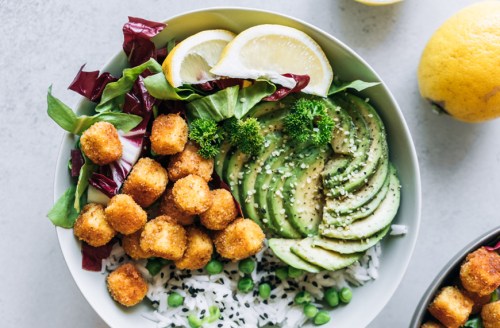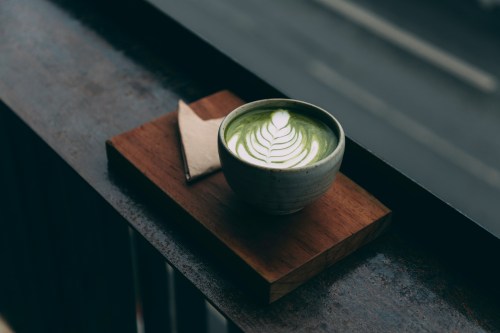If you’re thinking about going plant-based, you probably have a lot of questions. Like, where do you even start? Well, registered dietitians certainly know the struggle. Their clients ask them the same questions all the time, and that’s good news for you.
There’s no need to go down a rabbit hole on Google looking for answers to all your plant-based eating questions. You can get the most common ones answered right here, right now, by the registered dietitians who address them every single day.
The most common questions dietitians get asked about plant-based eating
1. Am I meeting my protein needs with plant based foods?
Most people still think of protein as meat, eggs, fish, and nothing else. But it’s super easy to get enough when you’re plant-based, too. “One of the biggest fallacies is that you can’t meet your protein needs on a plant-based diet,” says Brittany Modell, MS, RD, CDN, founder of Brittany Modell Nutrition and Wellness. “There are so many plant foods that are rich in protein, such as nuts, seeds, legumes, tofu, tempeh, and soybeans.”
2. Do I need to take any supplements?
While you can get all the protein you need from plants, Whitney English, RDN, of Plant-Based Juniors, recommends adding some supplements into the mix to make sure you’re hitting all your other nutritional needs. These needs (aside from B12) are simply due to environmental factors affecting all diets—not because plants are poor sources of nutrients, she says. “There are certain nutrients that are low or absent in a strictly plant-based diet. All vegans and vegetarians—and I recommend flexitarians, too—should take a daily B12 supplement, as plants are not a reliable source of this nutrient. I also recommend a vitamin D supplement. Many Americans, regardless of diet, are vitamin D deficient, and while you can theoretically meet your needs with sunlight, it’s best to supplement.” Individual supplement needs will vary, so you should really speak with your doctor before beginning a regimen.
English also recommends taking a plant-based DHA supplement. “Some people may want to take a plant-based DHA supplement—aka algae oil—as DHA is mainly found in seafood. Fish eat microalgae containing DHA and it accumulates in their tissues. Our bodies can make this fatty acid from plant-based foods containing the fatty acid ALA, such as chia seeds, walnuts, and flaxseed, but experts debate whether this is enough for good health,” she says. “And lastly, if you don’t consume iodized salt, you should supplement it. Plants do contain iodine from the soil, but amounts vary due to soil depletion.”
3. How many fruit and veggies should I actually be eating?
When you’re eating plant-based, your diet is loaded with fruit and veggies. It’s just hard to know how much you should be putting on your plate. According to Julia Zumpano, RD, a registered dietitian at the Cleveland Clinic, every meal should be made up of at least 50 percent vegetables. “The goal should be to get a minimum of seven to nine servings of vegetables a day, and two to three servings of fruit,” she says.
4. Do I have to go all in, all the time in order to reap the benefits?
Striving to eat a plant-based diet isn’t an all or nothing situation. You can better your health and the health of the planet without feeling like you need to do it full-time. “Many times we feel defeated if we don’t get everything 100 percent right. But even if going plant-based helps get you closer to eating one more fruit or one more vegetable, you’re doing a good job,” says plant-based dietitian Catherine Perez, RD. “Plus, you’ll most likely be introduced to foods you don’t typically eat regularly or be introduced to new foods that can have a positive impact on your health.”
5. Am I eating too many carbohydrates?
When going plant-based, it’s easy to focus your diet around carbs. Just make sure you’re not overdoing it. “Although carbohydrates are a necessary part of one’s diet, there is such a thing as consuming too many,” says Modell. “For example, I wouldn’t recommend having two cups of brown rice and a cup of beans at one meal. While following a plant-based diet, it’s important to add variety to your meals and incorporate high quality fats, such as avocado, nuts, and seeds as well to balance it.”
6. What are the best sources of healthy fats when eating plant-based?
There are many ways to get your healthy fats fix beyond animal sources. “Fats aren’t only in meats and dairy,” says Shawn Wells, RD. “The most important thing to remember is to get fats from whole foods, as they have not been processed or heated. Fats are easily damaged at high heats. Go for avocados, coconut (extra-virgin oil, flesh, and flour), extra-virgin olive oil, nuts (especially macadamias) and seeds (chia, hemp, pumpkin, and flax).”
The dirty dozen (and the clean fifteen):
This is the secret nutty sauce a doctor uses to make her plant-based meals “100 times better.” Then find out how all the new plant-based creamers on the market compare nutritionally.
Sign Up for Our Daily Newsletter
Get all the latest in wellness, trends, food, fitness, beauty, and more delivered right to your inbox.
Got it, you've been added to our email list.










